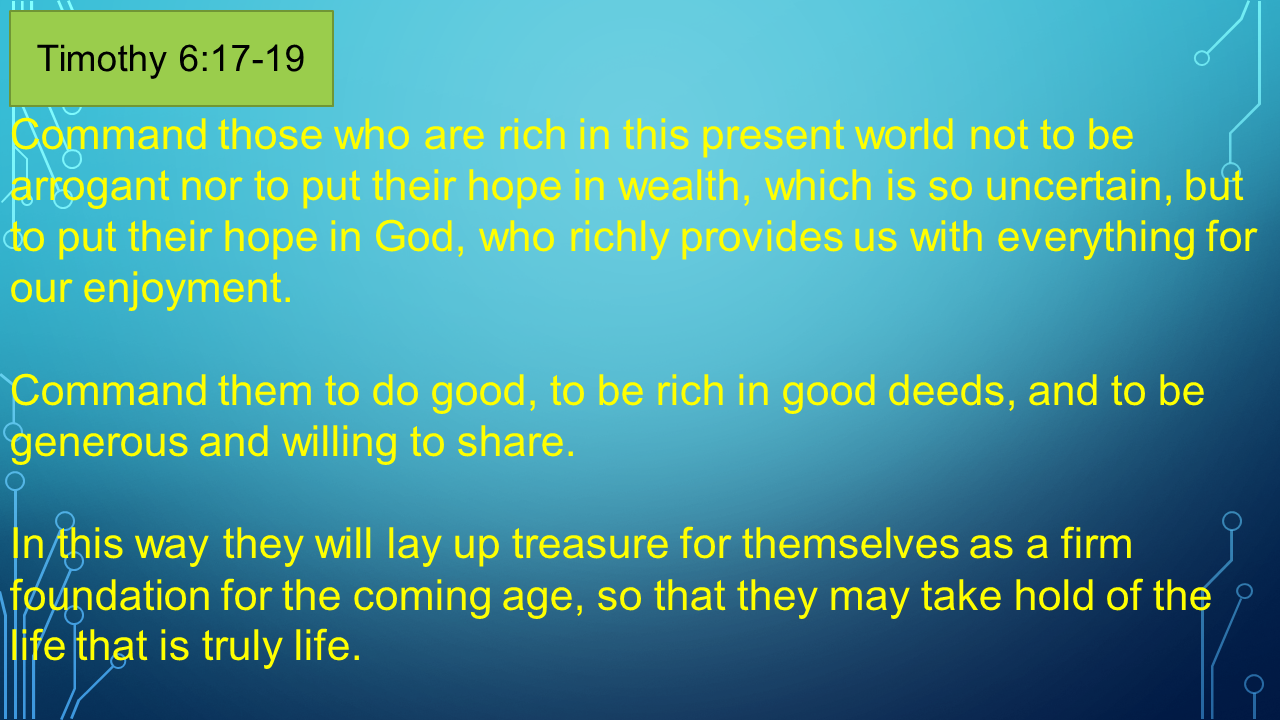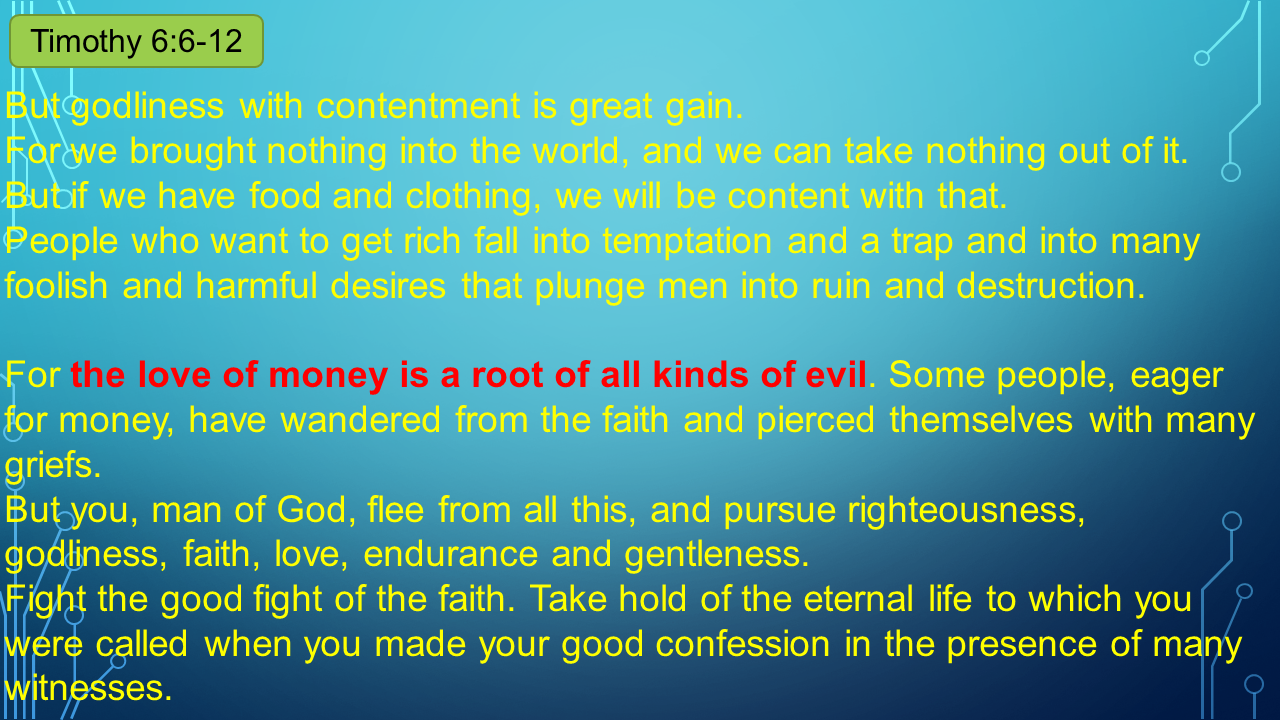No doubt human must put it’s best effort to have, in order to give & do Good Deeds with it.
Quran defines it’s role to verify, (مصدق تصدیق کننده) all previous books: Zabour, Torat, Bible & others & allowing to trickle down the fortune to others, to less fortunate like feeding the hungry, covering the naked, sheltering the shelter-less & in brief working for & towards social justice, as it is the purpose of all prophetess & is the number one of all the GOOD DEEDS.

The Torah manner of giving charity, respecting others’ property, and dealing honestly in business. An excerpt from Jewish Thoughts.
One’s love for God must exceed his love for all material things. We are commanded, “Love the Lord, your God… with all your might” (Deut. 6:5) — that is, even at the cost of all your wealth. Therefore, there are times when a person must be ready to sacrifice all his possessions for the sake of God, even though he is not required to give his life.
If one lives in a place where it is impossible to keep our religion, he must move to a place where it is possible, whatever the expense or loss. One must sacrifice all one’s possessions rather than actively violate any negative commandment in the torah.
One should therefore never do business where the Sabbath is the main market day, since he may succumb to the temptation of gaining extra profit on the Sabbath.
Although one must impoverish himself rather than actively sin, one need not do so for the sake of doing good. From the two agricultural tithes, we learn that God does not intend for us to use more than one-fifth (20 percent) of our means for religious purposes. Therefore, one need not spend more than a fifth of his money in order to perform a positive commandment, even if he will never have another chance to do it. For example, one need not spend more than this amount for a tallit or tefillin, a sukkah or etrog for Sukkot, or matzah for Passover.
Distributing Charity
Similarly, a fifth of one’s income is considered a generous contribution to charity, and should not be exceeded. It is forbidden to impoverish oneself by distributing all of one’s wealth to charity, and one who does so is counted among the foolishly pious who bring destruction to the world. However, one may leave as much as one-third of his estate to charity in his will.
In any case, a minimum of one-tenth of one’s income belongs to God, and should be used for charity or other religious purposes. This is a measure handed down from the Patriarchs, as Jacob himself said to God, “Of all that You give me, I will set aside a tenth to You” (Genesis 28:22). Similarly, the Talmud learns that we must give one-tenth of our income to charity from the verse, “Honor God with your wealth, and with the first fruits of all your produce” (Proverbs 3:9).
If there is an urgent need for charity or to perform any other commandment, one must sacrifice a fifth, or at least a tenth, of all his possessions. After the first time, however, one need only tithe from his yearly income. In any case, the very wealthy should give as much as is needed.
A person who gives less than a tenth of his income to charity is considered a miser.
It is a positive commandment to give charity, as the Torah states, “Open your hand generously, and extend to [your needy brother] any credit he needs to take care of his wants.” (Deut. 15:8). The minimum that one can give to fulfill this commandment is one-third of a shekel per year. It is thus written, “We have accepted upon ourselves to donate a third of a shekel annually for the service of the house of our God” (Nehemiah 10:33). This amount must be given by the poorest of the poor, since he would otherwise violate the commandment of charity. However, a person of ordinary means who gives less than a tenth of his income to charity is considered a miser.
If one is accustomed to use his tithe for charity alone, he may not use this money for any other religious purpose. However, he may use it to buy religious articles or books, which he will also lend to the poor, as long as they are clearly designated as such.
Enhancing the Mitzvot
We are required to perform God’s commandments in the choicest and most beautiful manner possible, as the Torah states, “This is my God and I will glorify Him” (Exodus 15:2). Therefore, whenever possible, one should not use the cheapest religious articles available, but should spend as much as a third more to obtain better ones. Whenever one has the choice between two such articles, he should spend a third more to buy the better one. For example, rather than buy a cheap tallit, one should spend a third more for a better one.
One who spends more than the required extra third to enhance his observance of the commandments is assured that God will amply repay him here on earth. Therefore, any unanticipated income should be used for this purpose.
One should always give his best for God, as we find, “The choicest belongs to God” (Leviticus 3:16). Thus, when a congregation builds a synagogue, it should be constructed as beautifully as possible, as the scripture intimates, “Our God has granted us favor… in order to raise up high the House of our God” (Ezra 9:9) There should be no show of poverty, false economy, or skimping in building a house dedicated to God’s Torah. Nevertheless, this should never be done at the expense of other charitable works, nor of denying affiliation to those of lesser means.
Lavishness and richness should be dictated by aesthetics and good taste.
However, even where sacred things are concerned, lavishness and richness should be dictated by aesthetics and good taste, and not by mere ostentation and the desire to spend money. For example, one should not use gold where silver would do just as well.
We are taught that the Torah has regard for our money, and it should not be spent wastefully. We find this in the case of a plagued house, where it is stated, “The priest shall give orders that the house be emptied out before [any] priest comes to see the mark, so that everything in the house will not become unclean. Only then shall a priest come to see the house” (Leviticus 14:36).
Similarly, we find that God performed miracles, to save not only our lives, but also our possessions, as when He caused water to flow in the wilderness both for the Israelites and their livestock.
Don’t Be Wasteful
It is forbidden to wastefully destroy any useful object, as we learn from the commandment, “You must not destroy [the city’s] trees” (Deut. 20:19). One who wantonly destroys furniture or utensils, tears clothing, or wastes good food, is guilty of violating this commandment. Furthermore, if he does so in anger, it is considered as if he had committed idolatry. One should not destroy anything over which a blessing can be said, as it is written, “Do not destroy [the grapevine] for the blessing [over its wine] is in it.” (Isaiah 65:8).
All such destruction is only forbidden when it is without purpose. If there is any logical reason or use for it, it is permitted. Furthermore, where there is any question of health, it is certainly better to destroy one’s possessions than one’s well being.
It is similarly forbidden to damage or destroy another’s property, or to do anything which might even directly cause such damage. If one causes damage, he is required to make restitution, as it is written, “If one kills an [other’s] animal, he must pay for it, [the value of] a life for a life” (Leviticus 24:18).
Cheating and Stealing
It is forbidden to rob, steal or illegally hold on to any property or money, as we are commanded, “Do not steal… Do not withhold that which is due your neighbor. Do not rob” (Leviticus 19:11, 13). One must therefore be extremely careful not to take illegal possession of any money or property in any manner, no matter how trivial its worth, whether it be from an adult or a child.
It is forbidden to steal as a joke or to tease, even if one intends to return it immediately. The prophet thus says, “If a wicked man… pays for what he stole” (Ezekiel 33:15), from which we learn that stealing is considered wicked even if the thief originally intended to pay for or replace the stolen article.
We are commanded to return any property that is illegally in our possession, as the Torah states, “He must return the stolen article, the withheld funds, the article left for safekeeping, the found article” (Leviticus 5:23). If the stolen article is available and intact, it must be returned, otherwise, restitution must be made for its value at the time of the theft. If the owner has moved to a distant town, we are not required to bring the stolen article to him, but must inform him so that he can come and get it. If the owner dies, restitution should be made to his heirs.
One who robs or cheats the public has no one to repay and can never actually rectify his crime. However, he should do his best to work for the public welfare and supply public needs, in order that those from whom he stole can benefit indirectly. If he is able, he should also make a public confession and ask forgiveness.
It is forbidden to buy a stolen article, as one thereby becomes an accomplice to the thief and encourages him to steal more. Regarding this it is written, “One who shares with a thief hates his own soul” (Proverbs 29:24). It is likewise forbidden to make use of a stolen article or derive any benefit from it. One should therefore not buy anything that is likely to have been stolen or obtained dishonestly. One who deals with stolen property in any way is considered like one who robs the public, and his repentance is extremely difficult.
Other’s Possessions
Borrowing without permission is considered the same as stealing. It is therefore forbidden to make any use of another’s property or possessions without permission. This is true even when he is certain that such permission would readily be granted.
If one’s coat or other possessions are accidentally exchanged at a public gathering or party, he must restore the article to its rightful owner, even though his own might be irrevocably lost. Similarly, if another person’s clothing is returned in the laundry, or any similar situation, one should not use it in the interim, but rather make every attempt to restore it to its owner.
One should not accept anything that is given out of duress or shame. Accepting a present that is not given wholeheartedly is akin to theft. Regarding this we are cautioned, “He who is greedy of gain destroys his own house, but he who hates gifts shall live” (Proverbs 15:27). Therefore, one should not eat in a home where there is not enough food, or where the invitation is insincere, as we are taught, “Do not eat the bread of a stingy man” (Proverbs 23:6).
It is forbidden to desire another’s possessions, as we are commanded, “Do not desire your neighbor’s house, his field, his servant… or anything else that is your neighbor’s (Deut. 5:18). If one forces the issue where an article is not for sale, and convinces the owner to sell it against his will, he is also guilty of violating the parallel commandment, “Do not be envious of your neighbor’s house… or anything else that is your neighbor’s” (Exodus 20:14). Both of these laws are in the Ten Commandments, and apply even where no dishonesty is involved.
Business Transactions
It is forbidden to be dishonest or cheat in any business transaction, as we are commanded, “When you sell… or buy [property] from your neighbor, do not cheat one another” (Leviticus 25:14). Maintaining strict honesty in business dealings is equivalent to upholding the entire Torah, and is the first thing for which one is judged in the heavenly court.
Maintaining honesty in business is the first thing judged in the heavenly court.
Just as it is forbidden to be dishonest to a fellow Jew, so is it forbidden to rob, cheat or steal from a non-Jew in any manner. In many cases, this is worse than stealing from a fellow Jew, since it gives our people a bad reputation and is a desecration of God’s name.
One’s honesty should go far beyond the mere requirements of the Law, and all of one’s dealings should be with absolute integrity and fairness to all. In all walks of life, one must be aware that he is constantly watched by God, and act accordingly. We are therefore commanded, “Do what is upright and good in God’s eyes” (Deut. 6:18).
It is forbidden to use dishonest money for charity or any other religious purpose, as God told His prophet, “For I, God, love justice, I hate robbery” (Isaiah 61:8). The Psalmist similarly teaches us, “The robber blesses, but [in so doing] scorns God” (Psalms 10:3). Similarly, one who has excessive debts should repay them before intemperately contributing to charity.
It is a blessing to be able to earn our own way in the world and thereby enjoy the fruits of our own labor, as the Psalmist writes, “You shall eat the fruit of your effort — you shall be happy and it shall be well with you” (Psalms 128:2). Still, one’s business or career should always be secondary to his duties toward God. One who places material considerations before his service of God is guilty of violating the commandment to love God above all.
From Handbook of Jewish Thought. “The Handbook of Jewish Thought” (Vol. 2, Maznaim Publishing. Reprinted with permission.
If you are at financial difficulty, keep this in mind:
We all know people who may be less educated, less intelligent or work less but have more financial gains, or it’s opposite, people with more education & harder working than us, but with less material gains.
How can we explain why some college drop outs like Bill Gates and Steve Jobs hire thousands of more educated and intelligent university graduates?
While we are obligated to present our best effort and knowledge in life, we must be detached from the outcome. Being contempt causes happier lives & therefore we may achieve our financial goals faster.
Living in present and enjoying life as is, to be fulfilled at all times, even in hardships helps us in this journey called life.

Keeping in mind material, (fame or fortune) are deceiving, only good to determine our eternal destiny.
A reminder that God is true owner of everything, not us.
Quran: 53:31
And yes, to God belongs all that is in the heavens and on earth. He punishes those who do evil according to their deeds, and he rewards those who do Good Deeds, with what is best.

Arrogance and forgetfulness is in human nature
Quran; 39:49 “Now, when trouble touches man, he cries to Us, but when we bestow a favor upon him as from Ourselves, he says, This has been given to me because of a certain knowledge I have! No, this is only a trial, but most of them do not understand.”
Quran 10:12 “When trouble touches a man, he cries unto us in all postures, lying down on his side, sitting or standing, but when we have solved his troubles, he passes on his way as if he had never cried to us for a trouble that touched him, thus doing the deeds of wasteful people seem attractive & fair in their eyes.”


Quran 57:20 “Know that this worldly life is no more than play and amusement, and cause of boasting among you, and increase in wealth and children is like after an abundant rain, and growing seeds that excites, as it appears pleasing to the eyes (of farmers). They grow and multiply but ultimately they dry and turn yellow, and become worthless hay. And in the Hereafter there is severe retribution for material minded, and forgiveness from God, and approval. This worldly life is no more than a deceiving enjoyment.”
Quran 21:47
“And We set the scales evenly in Day of Judgement admitting of no deviation and We judge with absolute justice and accordingly. No soul shall ever be wronged in the least.
Every deed, good or bad, will We present with precision even if it be as light or as little as a mustard seed. Enough are We in putting the law in execution.”


Nothing wrong with trying hard or having a lot:
7:32
| قُلْ مَنْ حَرَّمَ زِينَةَ اللَّهِ الَّتِي أَخْرَجَ لِعِبَادِهِ وَالطَّيِّبَاتِ مِنَ الرِّزْقِ ۚ قُلْ هِيَ لِلَّذِينَ آمَنُوا فِي الْحَيَاةِ الدُّنْيَا خَالِصَةً يَوْمَ الْقِيَامَةِ ۗ كَذَٰلِكَ نُفَصِّلُ الْآيَاتِ لِقَوْمٍ يَعْلَمُونَ |

